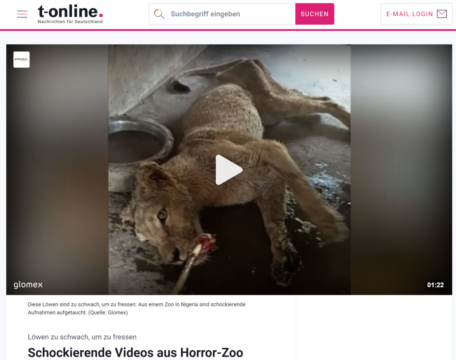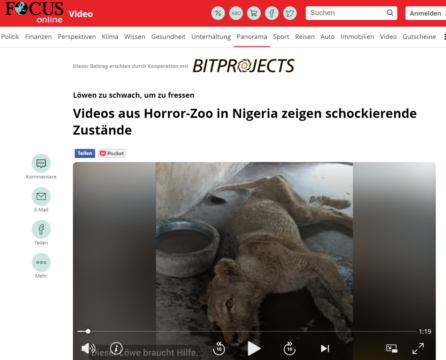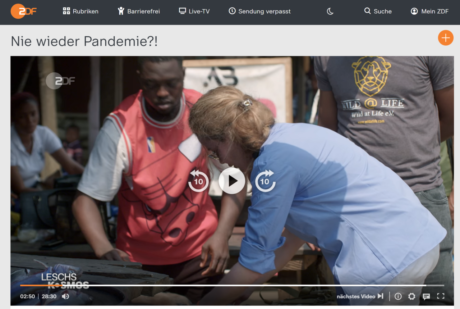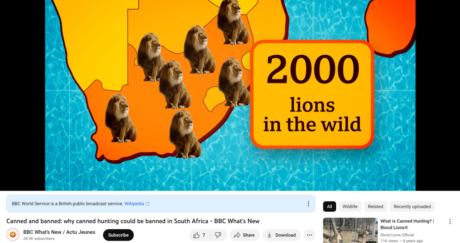Information about our activities published in the mass media.
Category: Media Mentions
Project update
March 11, 2023
Our rescue mission in Nigeria was covered by t-online. The video is in German.
Project update
March 10, 2023
Wild at Life e.V.’s rescue mission was picked up by FOCUS. Please keep in mind that unlike what the article states, Wild at Life e.V. is based in Frankfurt, Germany. The video and article are in German.
Project update
January 10, 2023
Wild at Life e.V. feels incredibly honoured to have been featured in ZDF. We hope that this exposure will help to raise awareness about the bushmeat and wet market industries that exist in some parts of our world. By shedding
News
May 5, 2022
Power of Positivity posted a video on their Instagram covering Wild at Life e.V.’s baby duiker rescue. The video’s subtitles are in English.
News
March 31, 2022
Learn about our passionate mission to protect these endangered creatures and the critical work we undertake to rescue, rehabilitate, and release them back into the wild. Thank you Power of Positivity for the feature!
Project update
January 28, 2022
BBC What’s New published a Youtube video on the truth behind the lion breeding industry, where lion cubs are taken at a young age to be used as attractions in petting zoos, and older lions are sold to canned hunting
Project update
July 15, 2021
Check out Jampressltd’s Instagram covering the rescue of Matiaba from Wild at Life e.V’s Mission Caita in Angola. The video’s subtitles are in English.
Project update
July 15, 2021
RTL News shares the story of Matiaba being rescued from the hands of poachers who killed his mother. In the sanctuary where he was brought to, Matiaba is raised with a feeding bottle and slowly regains his lost self-confidence. The
Project update
June 14, 2021
Conservation Conversation shared Georges’ story, the lion that was sparred from the canned hunting industry because of this crooked tail. The article is in English.
Project update
June 3, 2021
andanews made an Instagram post on our mission in South Africa where we saved Georges, Elma, Eva, and Julie from a canned hunting farm. The post is in Portugese.
Project update
June 2, 2021
RTL News sheds light on the cruelty behind trophy hunting as well as animal properties for medicinal uses. The article is in German.
Project update
May 28, 2021
The DailyMail documents the process of tranquillizing and relocating Georges, Eva, Elma and Julie. The article is in English.
Project update
May 7, 2021
The Dodo made a video and interview Wild at Life e.V.’s founder Asli Han Gedik. The video is in English.
News
April 8, 2021
Power of Positivity has put together a lovely video introducing Wild at Life e.V. and the works that we do. The video is in English.
News
March 24, 2021
We sincerely appreciate the feature and the platform it provides for us to raise awareness about our cause – thank you! The article is in Italian.
Project update
March 24, 2021
Zeze, who suffered a machete wound that left him blind, is now happily thriving in Jane Goodall’s Tchimpounga sanctuary in Congo. The article is in English.
Project update
March 17, 2021
The article discusses the ongoing debate around the role of wet markets in the emergence and spread of zoonotic diseases. It highlights that many wet markets across the world, such as those in China and Nigeria, continue to operate with
Project update
February 27, 2021
lapatilla reports that wild animals, both alive and dead, are being sold in deplorable sanitary conditions in a wet market in Lagos. And emphasised that all animals are infected with something, and only some are infectious to humans. Having many
Project update
February 22, 2021
Viva talks about the sale of boiled monkeys and crocodiles in these markets, which may pose a risk for the transmission of diseases to humans. The article is in Bahasa Indonesia.
No more posts to show
Search for more
Looking for something specific?






